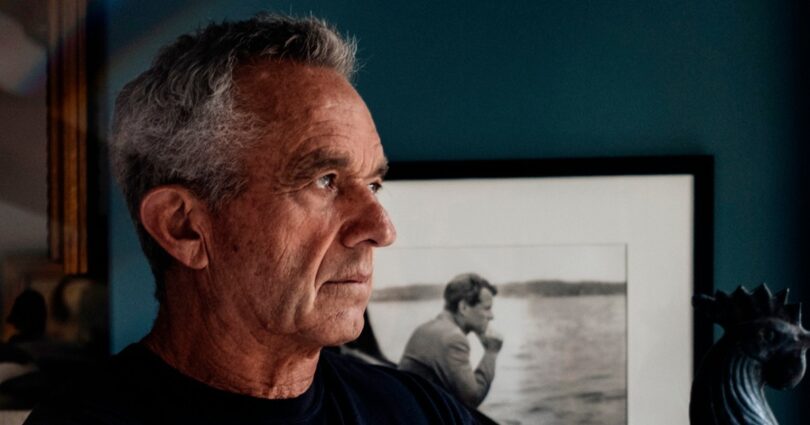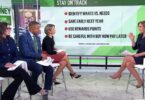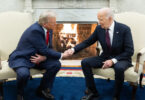LOS ANGELES — Robert F. Kennedy Jr. stands at the edge of a cliff, while his three dogs sit at attention, waiting for a treat from his pocket.
It is gray and spitting rain, and Kennedy — scion of America’s most famous political family, challenger in the Democratic presidential primary and one of the world’s foremost conspiracy theorists — is partway up a 3-mile trail near Mandeville Canyon, a hike he makes every morning with his two Gordon setters and 1-year-old German shorthaired pointer.
I am one of many reporters dispatched to profile Kennedy, who is so busy, and has so many journalists attached to the campaign, according to his press person, that accompanying him to official events won’t be possible. So, on a Monday morning in late May, we are on this hike instead, a winding trek up and back down a steep hill, as Kennedy lays out his vision of the country he aims to lead.
He sees America as a divided place, where an elite few conspire to crush the rest, where doctors poison the public, and where few institutions or experts can be trusted. “People should be scared,” he tells me.
It’s a dark notion, one Kennedy believes that he, as president, can save the country from.
As Kennedy speaks, his dogs remain at attention. For a long time. No treats are given.
“It’s something called an intermittent reward system,” Kennedy, noticing my discomfort, explains of the lapse. “I learned it from falconry. If you don’t give the animal a treat every time, it actually makes them more obedient.”
Something about the way the dogs are perched, salivating, their trusting eyes glued to Kennedy, reminds me of the way the world has recently been gripped by conspiracy theories — many of which Kennedy has helped spread: ones that imagine clouds as government-sprayed chemicals, cellular networks as surveillance plots — and lifesaving vaccines as poison.
He flicks three treats into the air and the dogs snap up their rewards.
Kennedy, 69, drove us to the trail in his taupe minivan, a beater without working seatbelts or back seats, meant for ferrying dogs and any wild animals he may find in need of help. He’s known to decline interview requests from large outlets, including a handful from me over the years, so I ask why he’s agreed to meet. Kennedy shrugs and says he’s always been open — it’s the press that’s hostile.
He disappeared from most networks and news organizations years ago — when his anti-vaccine activism became unpalatable to most Americans. His paranoia and anti-vaccine proselytizing during the pandemic only made him more of a pariah. But since he announced in April that he is running for president, the networks have come calling, and he’s been reinstated on Instagram after a 2021 ban for spreading misinformation.
That invitation back into polite society, at a moment when he’s got so much to say, is part of the reason he’s running.
“There are rules that make it difficult for the public airwaves to censor you,” Kennedy says, misciting a federal law that requires broadcast stations provide candidates for public office with equal opportunity to airtime. “So I thought maybe I should run.”
But he swears it’s not just about the attention. “My wife would never let me run just to make a point,” he says, meaning the actor Cheryl Hines.
Kennedy says he was inspired by Jeremy Zogby, who shared “astonishing” polling numbers that made Kennedy think he had a real chance. He declined to share the numbers, but he says the poll pushed him to throw his hat into a primary that most people are calling a long shot. (Asked for confirmation, Zogby said, “At this stage we are not discussing publicly Mr. Kennedy’s internal polling.”) A CNN poll in May has Kennedy with 20% Democratic support, compared to 60% for incumbent Joe Biden.
From the command of his animals, to his stride, to the way he maintains eye contact just a hair longer than feels comfortable, Kennedy’s sense of confidence is palpable. Only one thing betrays it.
“I can’t stand my voice,” he says as I move my audio recorder closer.
His voice is gravelly and strained. It’s gotten progressively worse since the ’90s when Kennedy was diagnosed with spasmodic dysphonia, a rare neurological disorder that causes his larynx to tighten uncontrollably and his voice to halt and tremor.
But today, it sounds stronger than it has in years — a result of a recent surgery in Kyoto, Japan, Kennedy says, which implanted a titanium bridge between his vocal folds.
The cause of spasmodic dysphonia isn’t known; researchers think it might be genetic, or a leftover disability from a respiratory infection, or even stress.
Kennedy, though, suspects a flu vaccine may be to blame. “I haven’t been able to figure out any other cause,” he told a podcaster in 2021.
In a follow-up email, Kennedy said he wasn’t sure of the connection, calling it “my own speculation.” His press person sent links to fact sheets included in manufacturer packaging of more recent flu vaccines that list dysphonia among dozens of reported “adverse reactions.” The adverse reactions in those package inserts — which are legal, not medical documents — are based on unverified observations, and, as they make clear, don’t suggest the vaccine necessarily caused the reaction.
Kennedy’s suspicion would make his anti-vaccine activism personal.
But Kennedy doesn’t want to talk about vaccines — at least not from the campaign trail.








